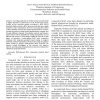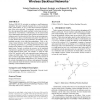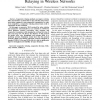120 search results - page 11 / 24 » MAC Performance of a 3GPP-LTE Multihop Cellular Network |
143
click to vote
AINA
2010
IEEE
15 years 6 months ago
2010
IEEE
— Growing popularity of wireless ad hoc networks leads to higher demands on performance of all TCP/IP stack layers. Usually ad hoc networks operate according to IEEE 802.11 stand...
117
click to vote
MOBICOM
2004
ACM
15 years 7 months ago
2004
ACM
Wireless IEEE 802.11 networks in residences, small businesses, and public “hot spots” typically encounter the wireline access link (DSL, cable modem, T1, etc.) as the slowest ...
103
click to vote
MOBIHOC
2005
ACM
16 years 1 months ago
2005
ACM
Analyzing TCP operation over 802.11 multihop ad hoc networks involves a cross-layer study. In this work, we investigate the effect of congestion and MAC contention on the interact...
111
click to vote
GLOBECOM
2009
IEEE
15 years 5 months ago
2009
IEEE
Cooperative relaying methods can improve wireless links, but introduce overhead due to relay selection and resource reservation compared to non-cooperative transmission. In order t...
118
click to vote
LCN
2006
IEEE
15 years 7 months ago
2006
IEEE
— Hybrid Medium Access Control (MAC) protocols combine the strength of random and schedule based MAC schemes. From random MAC schemes, Hybrid MAC protocols borrow flexibility an...



